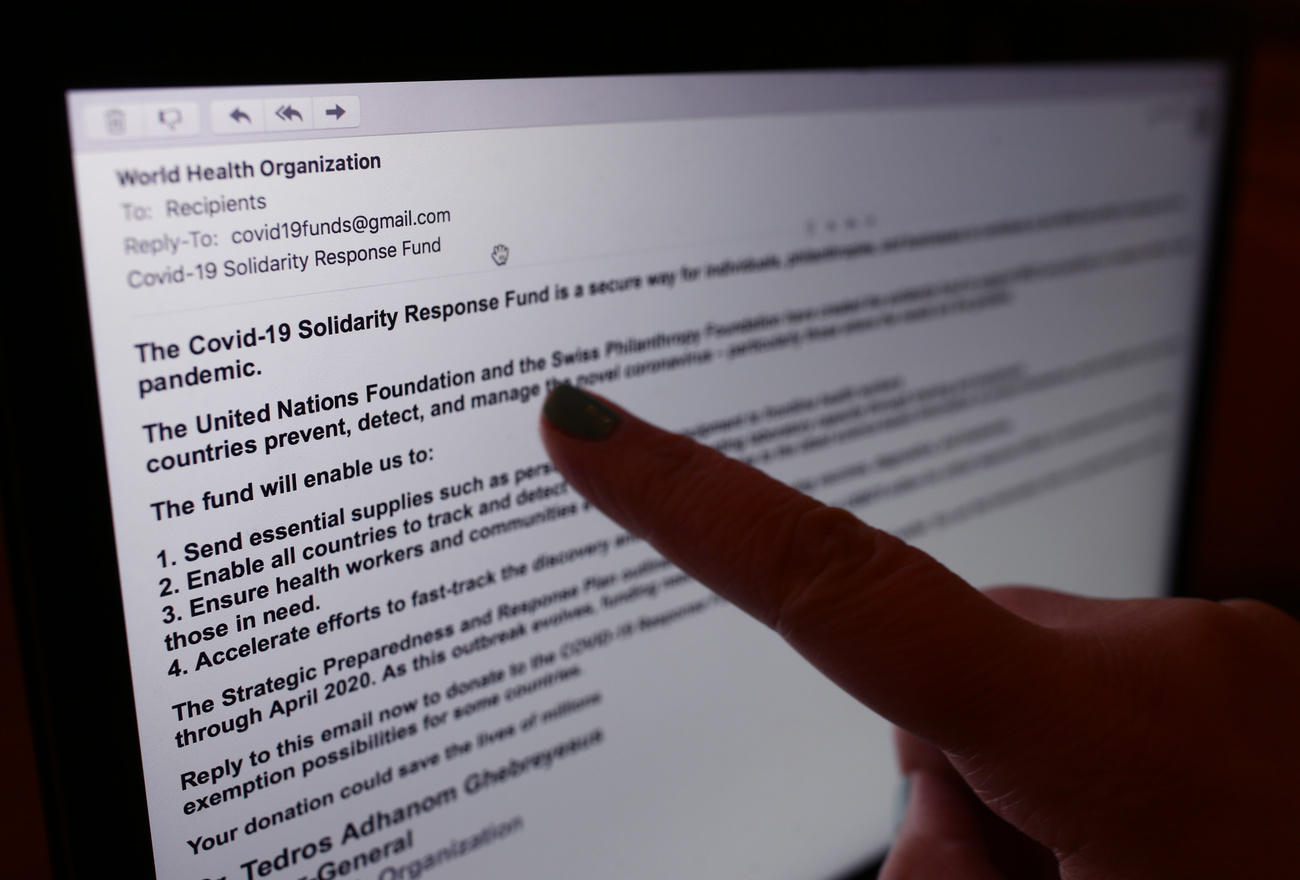
Switzerland sees more online crime amid coronavirus shock

Creative criminals are cashing in on the Covid-19 pandemic, tricking people out of their money online. A Swiss website dedicated to tracking cases of coronavirus fraud has logged more than 200 cases since its launch one month ago, most of them online scams relating to overpriced or bogus products.
“Most of the crimes that we have identified are carried out on the internet, so emails, websites, fake shops or posters for masks, emails offering masks that are fake,” says criminologist Olivier Beaudet-Labrecque. “In fact, you order the mask and never receive it. What we see the most are things that have a link to the internet and concern hygiene goods, such as masks, gels, gloves etc.”
The website coronafraud.chExternal link was launched on March 26 by The Institute for Combating Economic Crime (ILCE)External link at the University of Applied Sciences and Arts of Western Switzerland (HES-SO) in Neuchtel. The data collected is intended for research and is not passed on to the authorities. The national contact point for cyber security issues is the Reporting and Analysis Centre for Information Assurance (MELANI).External link

Fake medical goods
As of April 23, some 163 of a total 245 reports made on coronafraud.ch related to hygiene goods that were either non-compliant (expired mask, for example) or sold at what the victim considered to be an “abusive” price. About 21 reports related to businesses and shops who were not abiding by the guidelines of the authorities. The remainder were either irrelevant reports or ones relating to phishing efforts or dubious websites offering miracle remedies and online testing for coronavirus.
Some of the more shocking acts of fraud include the sale of masks for as much as CHF300 ($308) a piece and people who volunteer to do the groceries for the elderly, take their money but never deliver the goods. The elderly, however, are not necessarily the most likely victims for these kinds of crimes, in part because they are not huge internet users relative to other age groups. The bulk of the victims were aged 31-50.
“There is no specific victim profile,” notes Beaudet-Labrecque. “It affects all ages and both sexes… Because you are more vulnerable, you are quicker to trust people offering help.”
The vast majority of reports of fraud originate from French-speaking Switzerland, which accounted for 148 reports, compared with 66 from Italian-speaking cantons and 31 from German-speaking regions. Beaudet-Labrecque cautions that these trends may be a function of the project’s visibility in different parts of the country, rather than a higher likelihood of fraud occurring in one language region versus the other.
Cyber camouflage
Some opportunists are posing as well-known organisations responding to the pandemic. A notorious case concerned a phishing email requesting a Bitcoin donation for the World Health Organization, so that it could help to ensure front-line workers get essential supplies and countries with the “weakest health systems” are able to cope with Covid-19.
“Due to the general uncertainty surrounding the Coronavirus/Covid-19 pandemic, there is an increase in criminals looking to take advantage of the situation,” notes Credit Suisse on its website, encouraging its clients to remain vigilant against government impersonation scams, investment scams relating to Covid-19 supplies, fraudulent donations and fraudsters who create clone firms.
Zurich Police have warned against fake coronavirus mapping apps and fraudulent fundraisers.
The European police authority made a similar warning focused on phony medicine in late March. As news site Deutsche Welle reported at the time, police identified 2,000 websites offering fake coronavirus treatments during a global sting operation codenamed “Pandea”. About four million packages of fake medicine were seized across 90 countries.
In the United States, the Federal Bureau of Investigation (FBI) issued a warning to Americans on March 22. “Scammers are leveraging the COVID-19 pandemic to steal your money, your personal information, or both,” noted the alert. It warned the public to watch out for fake emails from the Centers for Disease Control and Prevention (CDC).
Fraudsters, noted the alert, can use emailed links to deliver malware and steal personal data or lock a computer and demand payment from its user.
Exploiting disaster
Beaudet-Labrecque sees some parallels between the Swiss experience and the kind of fraud committed after a natural disaster, such as a tornado hitting the USt. In both cases, people emerge offering “help”, preying on the vulnerable state of the victim who has been hit by catastrophe.
“Being in a total state of shock, stress and fear creates conditions that are very auspicious for economic crime,” says the criminologist, who teaches at ILCE.

More
Coronavirus: the situation in Switzerland

In compliance with the JTI standards
More: SWI swissinfo.ch certified by the Journalism Trust Initiative








































You can find an overview of ongoing debates with our journalists here . Please join us!
If you want to start a conversation about a topic raised in this article or want to report factual errors, email us at english@swissinfo.ch.